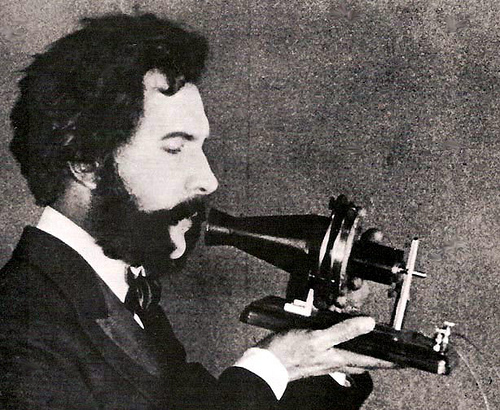“Mr. Watson, come here, I want to see you.” – Alexander Graham Bell, March 10, 1876
 Alexander Graham Bell is often portrayed as a husky, graybearded figure. But he was not yet thirty years old when he spoke the words that signified the invention of the telephone and sparked a revolution in communication.
Alexander Graham Bell is often portrayed as a husky, graybearded figure. But he was not yet thirty years old when he spoke the words that signified the invention of the telephone and sparked a revolution in communication.
From the time he was born in Edinbugh, Scotland in 1847, Bell was uniquely prepared to become the catalyst that changed the way people spoke to and heard each other. His father and grandfather were experts in elocution and the correction of speech and he was groomed to follow their professional path. Before he was a teen, his mother suffered from severe hearing loss–eventually leading to deafness–and Bell developed effective ways to communicate with her, including a manual finger language and a method of speaking clearly into her forehead. He was an exceptionally bright and curious in the sciences and he regularly accompanied his father to demonstrations on the instruction of the deaf and participated in the presentations.
Bell, who was known to friends and family as Alec, moved to Canada before settling in Boston where he worked as a teacher of the hearing impaired (he would eventually marry one of his former students, Mabel Gardiner Hubbard.) However, he increasingly found himself drawn to the research of sound and the transmission of speech and music. His work gathered the attention and money of wealthy sponsors, leading to the fateful moment 134 years ago today, as recorded in Bell’s journal:
 I then shouted into M [the mouthpiece] the following sentence: “Mr. Watson, come here — I want to see you.” To my delight he came and declared that he had heard and understood what I said.
I then shouted into M [the mouthpiece] the following sentence: “Mr. Watson, come here — I want to see you.” To my delight he came and declared that he had heard and understood what I said.
I asked him to repeat the words. He answered, “You said ‘Mr. Watson — come here — I want to see you.'” We then changed places and I listened at S [the speaker] while Mr. Watson read a few passages from a book into the mouthpiece M. It was certainly the case that articulate sounds proceeded from S. The effect was loud but indistinct and muffled.




